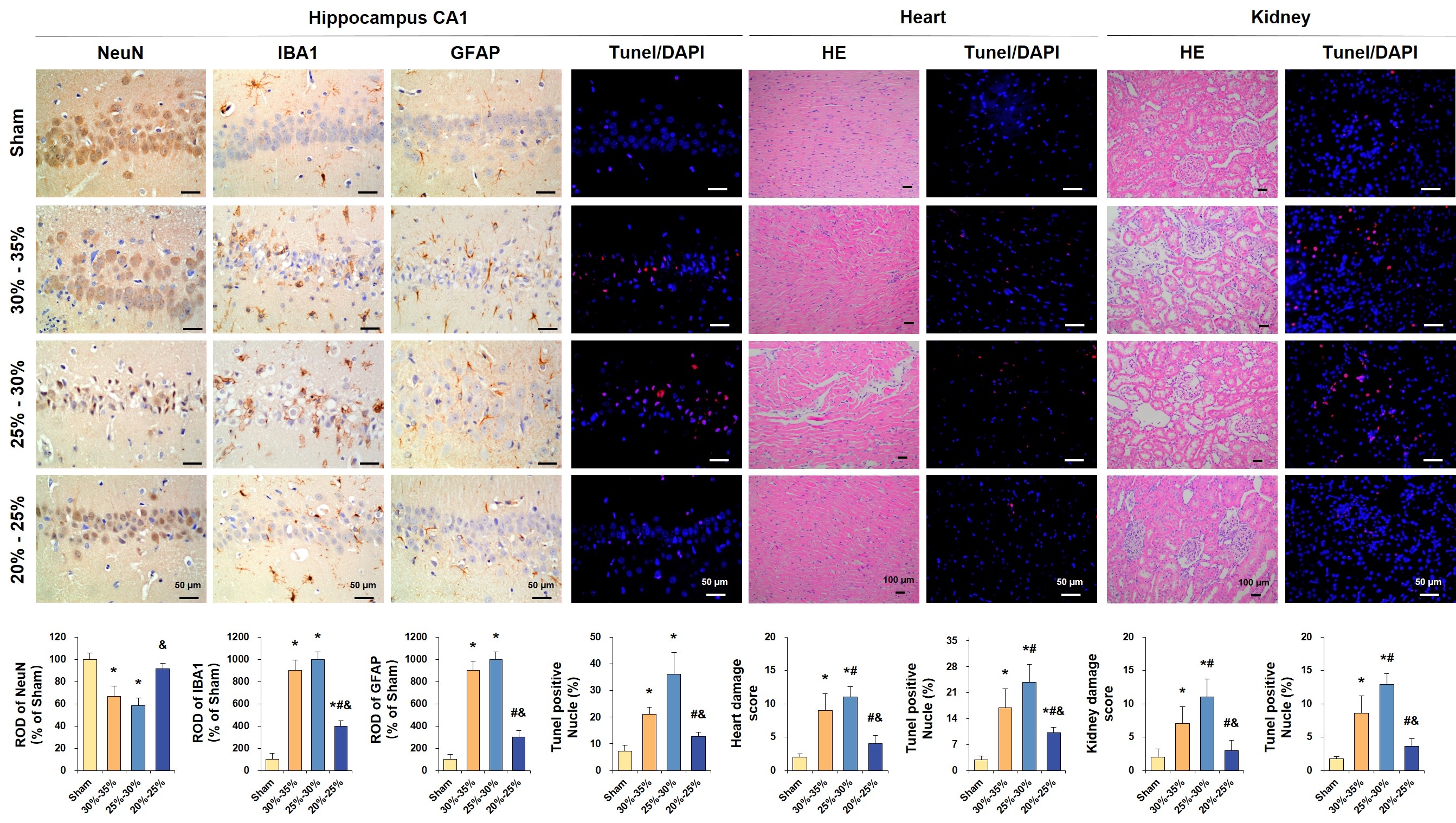Final ID: Sa209
Protective effects of hemodilution in emergency cardiopulmonary bypass resuscitation after cardiac arrest
Abstract Body:
Introduction: The no-reflow phenomenon is considered to be one of the important mechanisms of ischemia-reperfusion injury. Low hematocrit (Hct) after hemodilution can increase microcirculation flow by reducing blood viscosity and improve the non-reflow phenomenon after cardiac arrest. However, the effect of hemodilution remains controversial.
Hypothesis: To investigate the protective effect of hemodilution and the optimal Hct in emergency cardiopulmonary bypass (ECPB) resuscitation after cardiac arrest.
Methods: Male SD rats, 400-450 g were subjected to 8 min asphyxial CA and followed by ECPB resuscitation. Sham, Hct 30%-35%, Hct 25%-30% and Hct 20%-25% groups were included. Survival and Neurologic Deficit Score (NDS) were assessed at 24 h, 48 h and 72 h after return of spontaneous circulation (ROSC). Immunohistochemical staining for NeuN, IBA1, GFAP and Tunel staining were performed to assess neurological outcomes. HE staining and Tunel staining were performed to assess the outcomes of heart and kidney.
Results: There was no significant difference in survival among all groups. NDS in Hct 20%-25% group was significantly better than that in the Hct 30%-35% and Hct 25%-30% groups at 24 h after ROSC (P<0.05). Hippocampus was less injured in the Hct 20%-25% than in the Hct 30%-35% and Hct 25%-30% groups (Figure). Hct 20%-25% significantly attenuated damage to heart and kidney.
Conclusions: Hemodilution to Hct 20%-25% has a protective effect on the hippocampus, heart and kidney in ECPB resuscitation after cardiac arrest.
Introduction: The no-reflow phenomenon is considered to be one of the important mechanisms of ischemia-reperfusion injury. Low hematocrit (Hct) after hemodilution can increase microcirculation flow by reducing blood viscosity and improve the non-reflow phenomenon after cardiac arrest. However, the effect of hemodilution remains controversial.
Hypothesis: To investigate the protective effect of hemodilution and the optimal Hct in emergency cardiopulmonary bypass (ECPB) resuscitation after cardiac arrest.
Methods: Male SD rats, 400-450 g were subjected to 8 min asphyxial CA and followed by ECPB resuscitation. Sham, Hct 30%-35%, Hct 25%-30% and Hct 20%-25% groups were included. Survival and Neurologic Deficit Score (NDS) were assessed at 24 h, 48 h and 72 h after return of spontaneous circulation (ROSC). Immunohistochemical staining for NeuN, IBA1, GFAP and Tunel staining were performed to assess neurological outcomes. HE staining and Tunel staining were performed to assess the outcomes of heart and kidney.
Results: There was no significant difference in survival among all groups. NDS in Hct 20%-25% group was significantly better than that in the Hct 30%-35% and Hct 25%-30% groups at 24 h after ROSC (P<0.05). Hippocampus was less injured in the Hct 20%-25% than in the Hct 30%-35% and Hct 25%-30% groups (Figure). Hct 20%-25% significantly attenuated damage to heart and kidney.
Conclusions: Hemodilution to Hct 20%-25% has a protective effect on the hippocampus, heart and kidney in ECPB resuscitation after cardiac arrest.
More abstracts on this topic:
A Case of Successful Resuscitation After Out-of-hospital Cardiac Arrest Caused by Undiagnosed Pheochromocytoma-induced Cardiomyopathy
Hatakeyama Toshihiro, Suetsugu Yusuke, Watanabe Kaoru, Matsushima Hisao
A Hospital-Wide Multidimensional Approach to Pediatric In-Hospital Cardiac Arrest Review: Early Identification and PreventionLoeb Daniel, Collins Kelly, Ortega Karina, Dewan Maya

